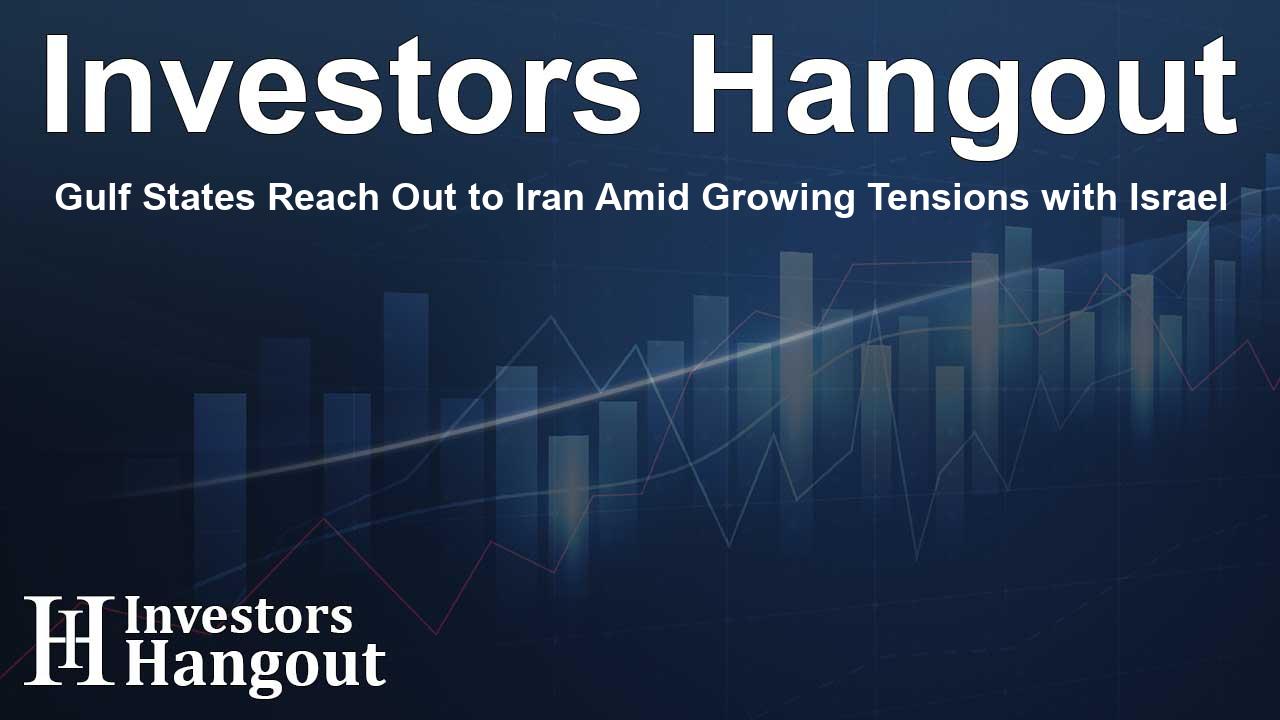Gulf States Reach Out to Iran Amid Growing Tensions with Israel

Gulf States Reassure Iran Amid Rising Tensions with Israel
In a world where geopolitical conflicts can shift rapidly, the Gulf Arab states are seeking to convey a message of neutrality to Iran regarding the ongoing tensions with Israel. This move comes at a critical time as the situation escalates between Tehran and Tel Aviv, raising concerns over the potential impact on vital oil facilities in the region.
Meetings Focused on De-escalation
This week, during meetings in Doha that involved ministers from Gulf Arab states and Iran, the discussions centered around de-escalation. The talks were framed within the context of a broader Asian gathering hosted by Qatar, emphasizing the need for stability and dialogue among all parties involved.
Iran's Largest Assault and Its Aftermath
Earlier in the week, the Islamic Republic executed what it characterized as its largest assault on Israel, which it justified as a retaliatory measure against previous Israeli attacks on Hamas and Hezbollah leaders and the ongoing situation in Gaza and Lebanon. Tehran spokespersons indicated that this offensive was now complete, conditional on avoidance of further provocation. In response, Israel has vowed to retaliate strongly should the conflict continue.
Concerns Over Oil Facilities
U.S. news sources have reported on Israel's intention to perhaps focus on Iranian oil production facilities as a retaliatory measure, highlighting the urgency for all sides to seek de-escalation. The delicate balance that Gulf states must maintain is further complicated by the intricate web of allegiances and enmities in the region.
Gulf States’ Cautious Stance
Interestingly, despite the rising tensions, Iran has not directly threatened oil facilities belonging to Gulf states. However, Iranian authorities have suggested that should allies of Israel intervene, their interests might become targets. This underlying tension compels Gulf states to be vigilant.
Regional Political Dynamics
Ali Shihabi, a commentator who maintains close ties with the Royal Court in Saudi Arabia, voiced that while it seems unlikely Iran will strike Gulf oil facilities, Tehran is subtly suggesting it retains this option as leverage against the U.S. and the broader global economy. The ongoing political dialogue between Saudi Arabia and Iran has shown some signs of rapprochement in recent years, contributing to a slight easing of regional tensions, albeit with challenges persisting.
Memory of Past Attacks
The implications of a potential attack are not lost on Saudi Arabia, which recalls the significant disruption caused by the 2019 assault on the Abqaiq refinery — an event that momentarily halted over 5% of global oil supply. Iran has continually denied involvement in that incident, yet the memory lingers, contributing to a sense of caution among Gulf states regarding their oil infrastructures.
Calls for De-escalation from Gulf Cooperation Council
The collective message from the Gulf Cooperation Council (GCC), which includes the UAE, Bahrain, Saudi Arabia, Oman, Qatar, and Kuwait, is one of urgent request for de-escalation. The aim is to foster a peaceful environment and to address mutual concerns before they spiral into uncontrollable conflict.
Iran's Assertive Stance
During the event in Doha, Iranian President Masoud Pezeshkian emphasized that Iran remains prepared to respond decisively to any military actions. He articulated that any military attack or perceived aggression would trigger a firm response from Tehran's armed forces, reflecting Iran's position in the unfolding regional dynamics.
Conclusion
The interactions between Gulf states and Iran underscore the delicate nature of regional politics, where the fear of escalation must be carefully navigated. As tensions with Israel escalate, the importance of communication and diplomacy takes center stage in ensuring the stability of the Gulf region.
Frequently Asked Questions
What prompted the Gulf states to reach out to Iran?
The Gulf states aim to assure Iran of their neutrality in the unfolding conflict with Israel and to promote de-escalation to protect their oil facilities.
What was Iran's recent military action against Israel?
Iran executed its largest attack on Israel, claiming it was a retaliation for Israel's actions against Hamas and Hezbollah leaders, but later stated that the assault was complete unless provoked further.
Are Gulf oil facilities safe from Iranian threats?
While Iran has not directly threatened Gulf oil facilities, they have warned that intervention by Israel's supporters could result in targeting their interests.
How has Saudi Arabia's relationship with Iran evolved?
Saudi Arabia has experienced a political rapprochement with Iran in recent years, easing some regional tensions, although substantial difficulties remain in their relations.
What historical events affect current regional dynamics?
The 2019 attack on Saudi Arabia's Abqaiq refinery remains a pivotal event, reminding Gulf nations of the vulnerabilities in their oil infrastructure and the risks posed by further hostilities.
About Investors Hangout
Investors Hangout is a leading online stock forum for financial discussion and learning, offering a wide range of free tools and resources. It draws in traders of all levels, who exchange market knowledge, investigate trading tactics, and keep an eye on industry developments in real time. Featuring financial articles, stock message boards, quotes, charts, company profiles, and live news updates. Through cooperative learning and a wealth of informational resources, it helps users from novices creating their first portfolios to experts honing their techniques. Join Investors Hangout today: https://investorshangout.com/
Disclaimer: The content of this article is solely for general informational purposes only; it does not represent legal, financial, or investment advice. Investors Hangout does not offer financial advice; the author is not a licensed financial advisor. Consult a qualified advisor before making any financial or investment decisions based on this article. The author's interpretation of publicly available data shapes the opinions presented here; as a result, they should not be taken as advice to purchase, sell, or hold any securities mentioned or any other investments. The author does not guarantee the accuracy, completeness, or timeliness of any material, providing it "as is." Information and market conditions may change; past performance is not indicative of future outcomes. If any of the material offered here is inaccurate, please contact us for corrections.